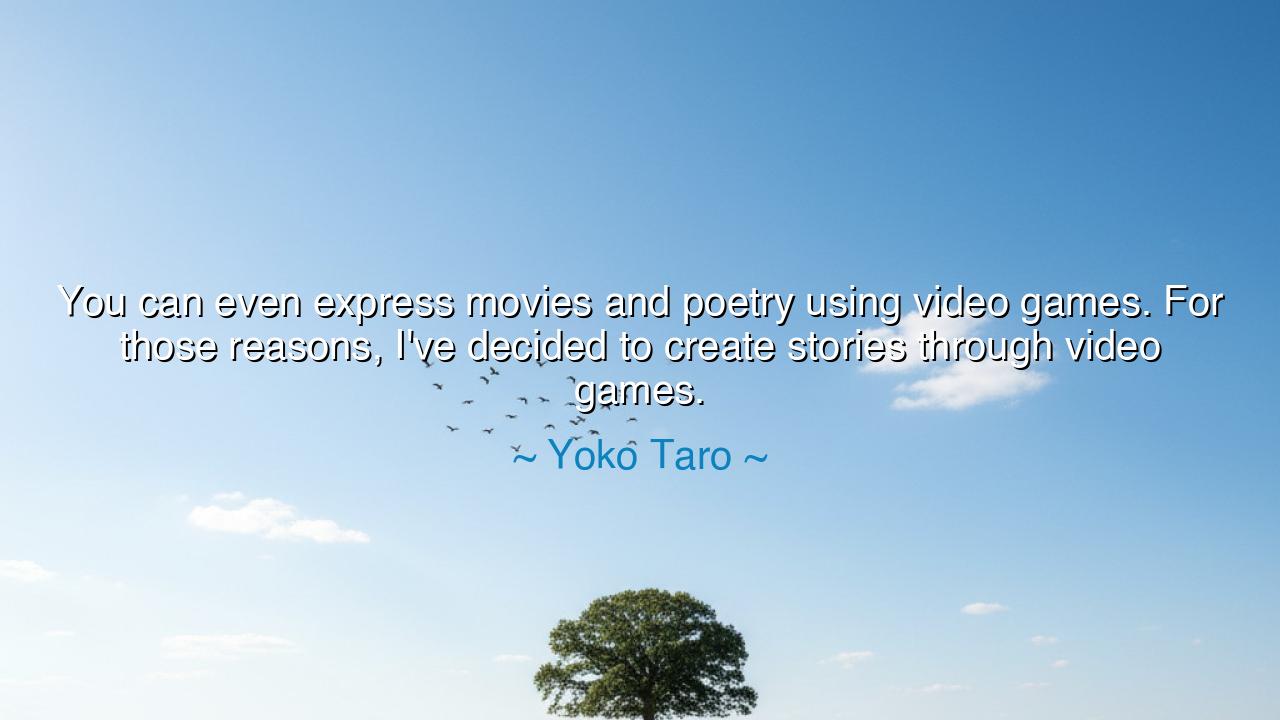
You can even express movies and poetry using video games. For
You can even express movies and poetry using video games. For those reasons, I've decided to create stories through video games.






“You can even express movies and poetry using video games. For those reasons, I’ve decided to create stories through video games.” Thus speaks Yoko Taro, a creator whose mask hides his face but whose works reveal the depths of his soul. His words are not only about entertainment, but about the destiny of art itself: that every medium, once thought trivial or mechanical, may become a vessel for truth, beauty, and revelation.
The meaning of this saying lies in the recognition of video games as a living art form. Where once they were dismissed as distractions or diversions, Yoko Taro declares them capable of bearing the weight of movies and the delicacy of poetry. For him, games are not only systems of play, but landscapes of emotion, where the player is not merely a watcher, but a participant. In this new medium, stories are not only told but lived, not only heard but enacted. Thus, video games become the stage where cinema’s grandeur and poetry’s intimacy unite.
The origin of Taro’s vision lies in his own works, such as NieR and NieR: Automata. In these games, players find themselves drawn into questions of identity, mortality, and the purpose of existence. Battles are fought, choices are made, and yet behind every struggle lies a meditation worthy of the ancients. Like the poets of old who wove parables into song, Yoko Taro weaves philosophy into play, revealing that even in digital landscapes, the eternal questions still burn: who are we, and why do we endure?
Consider the story of Homer, whose epics were once sung aloud to gathered audiences. To those who first heard them, they were not “literature,” but living experiences, woven with rhythm and memory. Centuries later, cinema would arise as the new Homeric form, carrying epics to the screen. And now, as Yoko Taro teaches, video games may serve as the next vessel in this chain, carrying not only spectacle but also poetry—images, metaphors, silences, and the weight of moral choice. Each age creates its own stage for timeless stories.
The lesson here is powerful: do not despise the new. The tools of our age—screens, controllers, networks—are not enemies of the spirit. They, too, can carry the eternal voice of art, if only guided by vision and integrity. What matters is not the medium but the intention: to create beauty, to tell truth, to awaken the soul. If poetry can live in ink and in song, it can also live in code and pixels. What Yoko Taro shows us is that art is not bound—it transforms with time, but its essence endures.
Practically, this means we should seek and create meaning in the tools of our own era. If you are a writer, do not fear to write through games, films, or digital media. If you are a player, approach games not only as distractions but as stories, as poems you participate in. And if you are a seeker of beauty, look for it everywhere—in books, in music, in cinema, and yes, even in the worlds of video games, where creators like Yoko Taro have hidden treasures of wisdom and sorrow.
Thus the teaching endures: movies and poetry can indeed be expressed in video games, for all art is but one river flowing through many channels. Yoko Taro’s choice to tell stories through this medium is not a departure from poetry, but its continuation in another form. Let us then honor the new stages of art, and participate in them with reverence, creativity, and courage. For the eternal voice of humanity speaks wherever we dare to listen—and it may yet speak in the hum of machines and the glow of the screen.






GDGold D.dragon
Yoko Taro’s decision to create stories through video games reflects a shift in how we define art. Is it enough for a video game to tell a story, or should it also make a deeper artistic statement like film or poetry? I wonder how this blending of different mediums affects the expectations of players. Can the beauty of a game’s story compete with the emotional impact of a great film or poem?
LNLoan Nguyen
I’m intrigued by the idea that video games can express poetry. Does this mean that video games can evoke complex themes and feelings in the same way poetry does? I’d love to explore games that aim for the same kind of emotional and philosophical depth that we often see in literary works. Could this shift change the way we think about storytelling in the future?
TLnguyen thi thuy linh
Yoko Taro’s statement brings up an interesting point about the evolving nature of storytelling. If video games can express complex narratives, does that mean they’re becoming an equal or even superior medium to movies or books? Could video games allow for new forms of literary expression? How do we reconcile traditional storytelling with the new interactive experiences provided by games?
DT11_1-Tran Thi Dong Tuyen
It’s interesting to think about how video games can express the same emotions or ideas found in movies and poetry. Can a game evoke the same kind of emotional depth as a film or poem, or is it fundamentally different? I wonder how much the visual, auditory, and interactive aspects of a game impact the emotional experience compared to more passive mediums like film and poetry.
PUNguyen Phuong Uyen
This idea of using video games as a storytelling tool makes me wonder how much of traditional storytelling can be adapted to this medium. Are there aspects of movies or poetry that don’t translate well into video games? Or does the interactive nature of games bring something new to the table that other forms of art can’t? I’m curious about the limits and possibilities of storytelling in gaming.